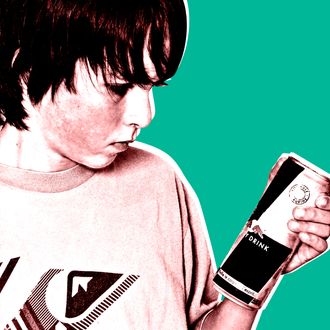
Lots of young people love energy drinks. About a third of kids between 10 and 19 years of age consume them regularly, according to a new paper in the Canadian Journal of Cardiology. And that’s a problem, note the authors, led by Dr. Fabian Sanchis-Gomar of the Research Institute of Hospital 12 de Octubre in Madrid, because these drinks have been linked to irregular cardiac activity, even in healthy adolescents.
Part of the problem is that energy drinks often contain a lot of caffeine; while the substance is usually harmless (I’d be in trouble if it weren’t), in large doses it can cause heart and other problems, and adolescents are more vulnerable to the effects than adults. Energy drinks also contain other substances that can have unpredictable effects, especially when they interact either with other stuff in energy drinks or with alcohol, a frequent energy-drink mixer among teens. Ginseng is a common component, for example, and its active ingredients “act on several different tissues and cells and produce a kaleidoscope of biological effects.”
Reviewing all this and some case studies of seemingly healthy teenagers who apparently had heart trouble as a result of energy-drink overconsumption, the researchers came up with some recommendations that, while “tentative” given how much more research is needed, are probably worth parents (and teens themselves) keeping in mind:
• Adolescents shouldn’t drink more than a can of energy drink per day
• They shouldn’t drink energy drinks before or during sports practice• Anyone with heart problems should check with a cardiologist before drinking energy drinks
• Energy drinks shouldn’t be combined with alcohol or other drugs, because that’s how some of the most potentially dangerous interactions take place
• Parents should be taught how to look for the “adverse effects related to ED consumption,” and they and others should advise teens not to overindulge in energy drinks
Given the wild popularity of these drinks and the fun social settings in which they’re imbibed, it’s probably going to be an uphill battle to get kids to cut back. But having these guidelines, even if they’re tentative, is still a helpful way to get across the point that energy drinks — especially when teens are drinking them — should be viewed in a different, more cautious light than coffee or soda.




